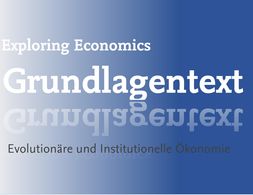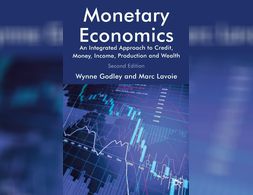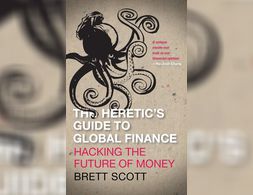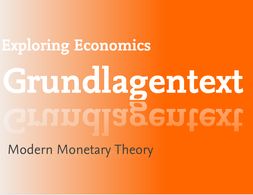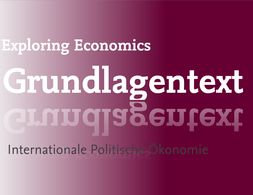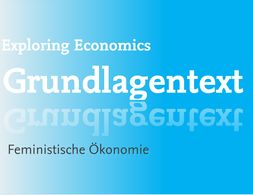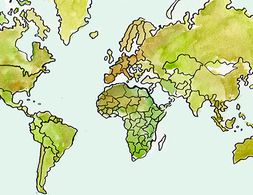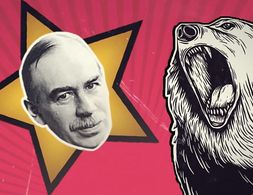382 Ergebnisse
What made the false assumption that saving the economy at all cost during a pandemic so popular? This paper discusses different pathways through the COVID-19 pandemic at national and international level, and their consequences on the health of citizens and their economies.
Die Evolutionäre und Institutionelle Ökonomie ist ein ökonomisches Paradigma, in welchem sozialer und ökonomischer Wandel eine zentrale Bedeutung einnehmen. In dieser heterodoxen Rolle außerhalb des wirtschaftswissenschaftlichen Mainstreams sehen einige die Evolutionsökonomie als eine Teildisziplin der Wirtschaftswissenschaften, die sich mit dynamischen Aspekten wirtschaftlichen Austausches befasst; für andere stellt sie eine Revolution wirtschaftstheoretischen Denkens dar. (vgl. Berendt/Glückler: 13 f.) Die Institutionelle Ökonomie zeigt Erklärungsansätze für wirtschaftliche Prozesse auf und betont, dass diese nicht ausschließlich durch „individuelles Rationalverhalten“ geprägt werden. Die Notwendigkeit von Institutionen wird betont, da ein individuelles, rationales Verhalten zu einer negativen Beeinflussung der Gemeinschaft führen kann und somit die Lösung über Institutionen erfolgen muss. (vgl. Nee, 2005: 49 ff)
This book challenges the mainstream paradigm, based on the inter-temporal optimisation of welfare by individual agents. It introduces a methodology for studying how institutions create flows of income, expenditure and production together with stocks of assets and liabilities, thereby determining how whole economies evolve through time.
Posteo is an innovative email provider that is concerned with sustainability and privacy and is completely ad-free. Our email accounts, calendars and address books can be synchronised - we use comprehensive encryption.
Manuel Schulz hat sich im Rahmen der Schreibwerkstatt "Varieties of Mainstream Economics?" kritisch mit dem normativen Selbstverständnis der Verhaltensökonomik auseinandergesetzt.
In this short video Peter Reich illustrates seven aspects of the state of the US economy. He provides suggestions on how to to get started to move towards a more fair distribution of wealth.
The effects of the 2020 pandemic on the Latin-American region: a thorough before-after analysis.
Why are some nations more prosperous than others? Why Nations Fail sets out to answer this question, with a compelling and elegantly argued new theory: that it is not down to climate, geography or culture, but because of institutions.
Mainstream economic theory has been increasingly questioned following the recent global financial crisis. Marc Lavoie shows how post-Keynesian theory can function as a coherent substitute by focusing on realistic assumptions and integrating the financial and real sides of the economy.
Popular anger against the financial system has never been higher, yet the practical workings of the system remain opaque to many people. The Heretic's Guide to Global Finance aims to bridge the gap between protest slogans and practical proposals for reform.
The first day of the workshop is intended to initiate students to the foundational concepts of ecological economics. Ecological economics is an ecological critique of economics, applying the energetics of life to the study of the economy. It also investigates the social distribution of environmental costs and benefits. It does so by deconstructing concepts that are taken for granted like “nature” or “the economy”, excavating their ideological origins.
This syllabus provides an overview of the contents of the course "The Philosophy and Methodology of Economics" at the Duke University
Die Modern Monetary Theory (kurz: MMT, dt: moderne Geldtheorie) ist eine geldtheoretische und makroökonomische Denkschule, bei der es hauptsächlich um die Analyse des Geld- und Kreditsystems und insbesondere um die Frage der Kreditschöpfung geht.
Die Darstellung von Unternehmen in Varians Lehrbuch „Grundzüge der Mikroökonomik“
In this episode of the Planet Money podcast the Caribbean island of Barbuda is used as an example to explore the notion of property rights Until the island was struck by Hurricane Irma in November 2017 the island belonged to all Barbudans First there is a brief historic background given …
Marx’s theory of the falling rate of profit is not only empirically borne out, but the theory he proposed seems to describe accurately how that happens. Furthermore, the whole process is useful for understanding the history of contemporary capitalism.
In diesem Text aus der Reihe "Exploring Economics - Foundations" werden die Grundlagen der Internationalen Politischen Ökonomie als interdisziplinäre wissenschaftliche Strömung dargestellt.
Die ökonomische Theorie hat mit Moral wenig oder gar nichts zu tun. In den gängigen Lehrbüchern der Mikroökonomie findet sich in den Stichwortverzeichnissen kein Eintrag zu Moral oder Ethik. Die Studierenden lernen über die Wirtschaft nachzudenken, aber sie lernen dabei nicht, systematisch über ethische Fragen zu reflektieren. Nach der neoklassischen Lehre, wie sie in den Lehrbüchern präsentiert wird, weist wirtschaftliches Handeln nicht grundsätzlich moralische Aspekte auf.
The module is designed to first present some of the main schools of thought from a historical and methodological perspective. Each week we explore and critically assess the main tenants of each school of thought. In the second part of the module we link history of economic thought and methodology to a specific and contemporary economic question. The second part allows you to engage with current economic issues with an awareness of methodology and methodological differences and with some knowledge of the history of economics.
The premise of this workshop is that we, as knowledge producers - especially within westernized universities (Grosfoguel, 2013), are significantly implicated in neoliberal imaginaries that are often in service of hierarchical, binary, competitive and linear narratives of growth as civilizational progress.
Bei der feministischen Ökonomie geht es darum, den unbezahlten Teil der Ökonomie sichtbar zu machen und die Geschlechterblindheit von ökonomischen Prozessen aufzudecken. Entstanden ist diese Theorierichtung in den 1960er Jahren, wobei die Wurzeln bis ins 19 Jahrhundert zurück reichen. Zu Beginn setzten sich die Feministen und Feministinnen vor allem für das Erreichen des Frauenwahlrechtes, für den Zugang zur Bildung und der Abschaffung der Vernunftehe ein. Die Gleichberechtigung von Mann und Frau war in der zweiten Welle des Feminismus zu finden. Bis heute gibt es zwischen Männern und Frauen Unterschiede, welche durch den Feminismus versucht werden aufzudecken und zu beseitigen. Zum Beispiel die Care-Arbeit, den Gender-Wage-Gap, keine Berücksichtigung in ökonomischen Modellen, etc.
Der Fokus der Neoklassik liegt auf dem Umgang mit knappen Ressourcen. Analysen beschäftigen sich mit der effizienten Allokation von Ressourcen, um den Wohlstand zu vermehren.
Eine Trilogie
Neue oekonomische Bildung
In aufgeheizten Zeiten mit noch aufgeheizteren Debatten lohnt es sich manchmal, einen Schritt zurückzutreten, um die Dinge grundsätzlich zu betrachten und nüchtern zu analysieren. Wenn man das bei dem seit November andauernden Streit über die Haushaltspolitik der Bundesregierung tut, kommt man zu einigen spannenden Erkenntnissen, erklären Jonas Plattner und Chiara Rohlfs in der Agora42 Kolumne.
This article investigates the set up of the CFA franc zones, its ties to French neocolonialism and its ability to further breed dependency in the former colonies.
Prof. Yanis Varoufakis talks in this introductory lecture about the future of our economy and the current state of economics with special regard to pluralism in economics.
In the pluralist showcase series by Rethinking Economics, Cahal Moran explores non-mainstream ideas in economics and how they are useful for explaining, understanding and predicting things in economics.
Dr. Katherine Trebeck explains some reasons why we should believe the future of the economy should be a wellbeing economy.
Pluralism includes mainstream economics. Our campaign for pluralism, including this series, have generally focused on ideas outside the mainstream on the basis that it gets plenty of attention already so we want to spend our time exposing people to alternatives. Nevertheless, mainstream ideas deserve some attention. On top of this, a curious feature of modern economics education is that some of the best ideas from mainstream economics are not even taught to undergraduates! During this series I will explore such ideas, starting today with the market construction technique known as ‘matching’.
Fighting Neoliberalism with Keynes & Minsky? Riccardo Bellofiore proposes to revise the insights of Minsky's financial instability hypothesis, combining it with the Keynesian theory of the monetary circuit to answer many questions in modern economy.
Looking for a pithy introduction into John Maynard Keynes's economic thinking? This BBC radio programme may be it.
Wir nutzen Cookies. Klicke auf "Akzeptieren" um uns dabei zu helfen, Exploring Economics immer besser zu machen!


